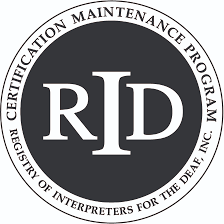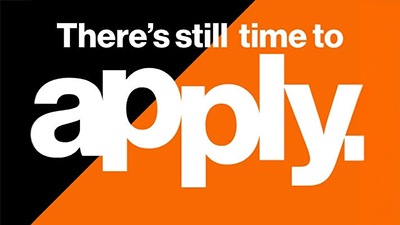Certificate in Educational Interpreting (Non-Credit)

Department of ASLIE
Certificate in Educational Interpreting
- RIT/
- National Technical Institute for the Deaf/
- Academics/
- Departments/
- ASLIE/
- Certificate in Educational Interpreting
Overview
The non-credit Certificate in Educational Interpreting (CEI) program provides specialized professional development to ASL/English interpreters working in educational settings. The curriculum is delivered in a blended online format, with asynchronous coursework supplemented by Zoom sessions from September to May. Nationally recognized Deaf education, educational interpreting, and interpreter education experts employ innovative teaching strategies through lectures, group discussions, case conferencing, reflective and deliberate practice, and application to real-world interpreting assignments.
The program offers three tracks:
- Primary Education (K-6)
- Secondary Education (7-12)
- Postsecondary Education
 |
 |
ASLIE is an Approved RID CMP Sponsor for continuing education activities. This certificate is a Professional Studies (PS) program offering up to 13 CEUs at the Some Content Knowledge Level. (The program also includes some instructional material which counts toward RID CMP’s Power, Privilege, and Oppression requirement.) Should you need an accommodation, please contact Lisa Prinzi at Lisa.Prinzi@rit.edu. This certificate program upholds nondiscriminatory practices and encourages a learning environment which is free from bias and promotes mutual respect.
Goals
The Certificate in Educational Interpreting program supports the professional development of interpreters working in K12 and postsecondary educational settings. The program enhances interpreting and performance analysis skills and expands participants' knowledge regarding the educational system, academic discourse, instructional strategies, and more by focusing on collaborative learning. Through this approach, CEI supports interpreters navigating various mainstream educational settings.
Outcomes
- Discuss the public education system, terminology related to education, institutional hierarchy, the roles and responsibilities of educational personnel, and gaps in support.
- Discuss federal regulations regarding the public education system (e.g., PL 94-142 and IDEA) and its impact on deaf students and interpreters in education (external demands; interpersonal demands).
- Discuss the foundational differences (and similarities) between spoken English and American Sign Language.
- Discuss the foundations and premises pertaining to bilingualism and the development of the bilingual child (and bilingual learner).
- Discuss the types and degrees of hearing loss and their impact on the child and on the act of educational interpreting.
- Discuss the forms of discourse found in educational settings and the design of educational discourse.
- Recognize key pragmatic components of given instructional material.
- Recognize the key English content to be rendered during typical instructional settings.
- For those in the elementary and secondary track: Discuss the responsibilities of the interpreter and other team members as identified in the Individualized Education Program (IEP) and know how to generate (and articulate) input for the IEP team, as well as be able to articulate the rights and responsibilities of parties engaged in the IEP process.
- For those in the post-secondary track: Discuss the responsibilities of the interpreter, the educator, and the student, and propose potential options when non-optimal interpreted learning is taking place.
- Discuss the meaning of a practice profession approach and professional responsibility.
- Identify and discuss strategies and techniques that foster effective communication within educational environments.
- Discuss the role of feedback (giving, receiving, and incorporating feedback) and assessment in the interpreting process: self-assessment, peer-directed, instructor- or supervisor-directed, and student-directed.
- Recognize issues in the work environment that may create distress within oneself and employ strategies for dealing with emotions.
- Analyze ethical dilemmas and apply ethical standards and practices via case conferencing and supervision.
- Examine how power, privilege, and oppression impact the interpreted event.
Format
The program includes approximately 135 hours of instruction using an online blended format. Students meet weekly in Zoom on Thursday evenings, from 7:00 PM – 8:00 PM (Eastern). Upon completion of the program, interpreters may receive up to 13.5 Continuing Education Units (CEUs) from the Registry of Interpreters for the Deaf.
Class assignments include readings, use of video materials, group discussions, reflections, and hands-on activities. Students should plan on scheduling an average of five to seven hours per week for successful engagement in this program.
The 9-month program runs from September through May.
Curriculum
The Deaf and Hard-of-Hearing Learner: Realities of an Interpreted Education
This module will focus on the challenges of Deaf and hard-of-hearing learners in a mainstream setting where students may experience linguistic, cognitive, and social deprivation.
Educational Discourse and Educational Outcomes
This module exposes interpreters to the array of discourse typically used in educational settings.
Interpreters will study curriculum forms and the formulaic design of educational curriculum as well as the typical discourse behaviors educators use while teaching.
Analysis and Translation of Educational Discourse
This module will continue to hone interpreters’ ability to analyze educational discourse function and style. Interpreters will generate ASL versions of spoken English instructional discourse. Interpreters will learn methods for mentoring peers and have opportunities to provide feedback.
Interpretation and Assessment: Grades K-6
Interpreters will develop the ability to analyze and interpret educational discourse across the K-6 curriculum and educational setting
Interpretation and Assessment: Grades 7-12
Interpreters will develop the ability to analyze and interpret educational discourse across the 7-12 curriculum and educational setting.
Interpretation and Assessment: Postsecondary
Interpreters will develop the ability to analyze and interpret educational discourse across the postsecondary educational setting.
Performance Analysis and Feedback
This module will focus on the role of performance analysis and feedback in the interpreting process. Interpreters will develop the ability to participate in feedback conversations with colleagues.
Multicultural Education: Advocacy and Allyship in Educational Settings
This module will explore cultural diversity in educational settings. Interpreters will develop an awareness and deeper understanding of cultural diversity issues, specifically in relation to audism and ableism.
Interpreting as a Practice Profession
Interpreters will develop the ability to analyze ethical dilemmas and apply ethical standards and practices via case conferencing.
Wellness & Self-Care for Interpreters
This module will focus on the role of self-care systems and wellness for interpreters working in educational settings.
Admission Criteria
The following criteria will be used to select applicants to participate in this program:
- Applicants must currently be interpreting in educational settings (primary-postsecondary).
- Applicants for the primary and secondary tracks must submit a valid EIPA assessment report with an EIPA aggregate score of at least 2.9 as a component of the application process.
- Applicants for the postsecondary track must possess an interpreter certification (e.g., RID or BEI) or equivalent. Applicants must submit a copy of it as a component of the application process.
- Applicants must commit to completing the entire program. (No refunds will be given.)
Equipment Needed
The following information explains the technical requirements for successful participation in NTID’s online, non-credit Certificate programs. It details the hardware and software requirements as well as the system requirements and Internet speed needed to engage with online classes successfully.
For an optimal learning experience in our online Certificate programs, students are required to have access to a working device that is less than 5 years old. The recommended devices are listed below:
- Desktop Computers with a built-in webcam or an external camera
- Laptops/MacBooks with a built-in webcam or an external camera
- Minimum of two monitors (strongly recommended for synchronous online courses)
Note: Chromebooks are not recommended for these programs due to potential compatibility issues with software and platforms like Zoom.
For the best experience with navigation, performance, accessibility, and compatibility on myCourses, it is required that all students use the latest version of a supported browser. The following browsers for the best use of myCourses are:
- Google Chrome (preferred) is highly recommended for its speed, performance, and compatibility with myCourses and GoReact.
- Firefox is another reliable option that you can use for myCourses.
- Microsoft Edge also works well with myCourses but it must be upgraded to the latest version.
Note: For Mac users, Safari browser is not recommended to use for MyCourses as it’s known to run into some functionality issues with MyCourses.
Your device must satisfy the minimum system requirements to ensure a successful online learning experience.
- Memory (RAM): Your computer must have at least 4 GB of RAM. However, 8 GB is highly recommended to ensure you can access all of the course materials, software, and resources faster, including video assignments without slowdowns.
- Operating System: The most recent versions of operating systems such as Windows 10 or 11, and Mac OS X (10.15 or above). Please note that Windows 10/11 S Mode is not supported.
- System Update: Your operating system must have the most recently released updates. These updates often resolve issues with web browsers and improve performances for software such as Zoom, MyCourses, and Microsoft Office.
A reliable high-speed internet connection with speeds of 20 Mbps or higher is recommended for online courses. This ensures smooth Zoom meetings, and quick access to all course materials, including video presentations. You can check your internet speed by going to www.speedtest.net or www.fast.com.
Program Coordinator and Instructor
Lisa Prinzi, Ph.D.
Lisa.Prinzi@rit.edu
 Dr. Lisa Prinzi has worked as an interpreter for more than 20 years, specializing in educational interpreting and as an interpreter educator. Lisa is an Assistant Professor in the Department of American Sign Language and Interpreting Education (ASLIE) at the Rochester Institute of Technology's National Technical Institute for the Deaf (RIT/NTID). She teaches core interpreting skills courses in the bachelor's degree program and the Certificate in Educational Interpreting. Her research focuses on interpreting in educational environments and professional development for educational interpreters.
Dr. Lisa Prinzi has worked as an interpreter for more than 20 years, specializing in educational interpreting and as an interpreter educator. Lisa is an Assistant Professor in the Department of American Sign Language and Interpreting Education (ASLIE) at the Rochester Institute of Technology's National Technical Institute for the Deaf (RIT/NTID). She teaches core interpreting skills courses in the bachelor's degree program and the Certificate in Educational Interpreting. Her research focuses on interpreting in educational environments and professional development for educational interpreters.
Contact
Please direct questions to CEI@rit.edu.




